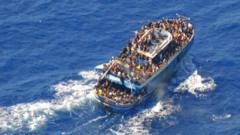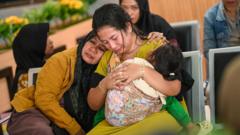A naval court in Greece has formally indicted 17 coastguards in connection with the tragic shipwreck off Pylos in June 2023, where an estimated 650 migrants lost their lives.
Greek Coastguards Indicted Over Fatal Mediterranean Migrant Shipwreck

Greek Coastguards Indicted Over Fatal Mediterranean Migrant Shipwreck
Charges mark a significant development as Greece confronts the aftermath of a major maritime tragedy.
The migrant boat sank with 650 people onboard. A naval court in Greece has charged 17 coastguards over the deadliest migrant boat disaster in the Mediterranean Sea for a decade. Up to 650 people were feared to have drowned when the overcrowded Adriana fishing vessel sank near Pylos, off the Greek coast, in the early hours of 14 June 2023. Survivors later told the BBC that Greek coastguards had caused their boat to capsize in a botched attempt to tow it and then silenced witnesses. "It has taken us two years just for these charges to come, even though so many people witnessed what happened," one of the survivors, a Syrian man we called Ahmad, said on Monday.
The Deputy Prosecutor of the Piraeus Naval Court has determined that 17 members of the Hellenic Coast Guard should face criminal charges. Among those charged is the captain of the coastguard ship LS-920, accused of "causing a shipwreck," which resulted in the deaths of "at least 82 people." This figure represents the number of bodies recovered; however, it is believed that around 500 more individuals perished, many of whom were women and children trapped below deck.
The devastating incident took place in international waters but was within Greece's designated rescue zone. Four officials, including the then-Chief of the Coast Guard and the Supervisor of the National Search and Rescue Coordination Centre in Piraeus, have been charged with "exposing others to danger." Additionally, the captain of LS-920 faces charges of "dangerous interference of maritime transport" and a "failure to provide assistance" to the migrant vessel. The rest of the crew members are charged with "simple complicity" in the acts allegedly committed by the captain.
Concerns surrounding the official Greek account of the events persist. Prior to the sinking, a coastguard ship monitored the Adriana for 15 hours. The boat had departed from Libya bound for Italy, with approximately 750 people on board; only 104 survived. Investigations have consistently questioned Greece's narrative of the incident, with shipping data contradicting their claims of the boat being in no distress.
Survivors, previously identified as Ahmad and Musaab, recounted their harrowing encounter. They described how coastguards allegedly caused the vessel to capsize. "They attached a rope from the left," Musaab recalled. "Everyone moved to the right side of our boat to balance it... They kept dragging it for quite a distance." Upon arriving at the port of Kalamata, survivors claimed they were silenced by coastguard officials who dismissed their accounts of the tragedy.
Ahmad, now living in Germany, expressed a sense of vindication following the charges against the coastguards, but he remains skeptical of the Greek justice system. "I'm very happy they are eventually being held accountable for all that they have committed, but until I see them in prison, nothing has been done yet," he said.
The legal team representing the survivors and victims welcomed the indictments as a pivotal moment in the pursuit of justice. They issued a statement expressing hope as the prosecution of the 17 coastguards, including senior officers, signifies a crucial milestone towards bringing accountability for the victims of the Pylos shipwreck.
The accused coastguards are expected to be questioned by the Deputy Prosecutor of the Piraeus Naval Court in the following weeks, leading to a decision on whether they will face a full trial or dismissal of the charges. The potential penalties for the coastguards, if convicted, remain unclear. The Greek government maintains that its Coast Guard has a robust commitment to human rights and has aided over 250,000 individuals rescued at sea in the past decade.
The Deputy Prosecutor of the Piraeus Naval Court has determined that 17 members of the Hellenic Coast Guard should face criminal charges. Among those charged is the captain of the coastguard ship LS-920, accused of "causing a shipwreck," which resulted in the deaths of "at least 82 people." This figure represents the number of bodies recovered; however, it is believed that around 500 more individuals perished, many of whom were women and children trapped below deck.
The devastating incident took place in international waters but was within Greece's designated rescue zone. Four officials, including the then-Chief of the Coast Guard and the Supervisor of the National Search and Rescue Coordination Centre in Piraeus, have been charged with "exposing others to danger." Additionally, the captain of LS-920 faces charges of "dangerous interference of maritime transport" and a "failure to provide assistance" to the migrant vessel. The rest of the crew members are charged with "simple complicity" in the acts allegedly committed by the captain.
Concerns surrounding the official Greek account of the events persist. Prior to the sinking, a coastguard ship monitored the Adriana for 15 hours. The boat had departed from Libya bound for Italy, with approximately 750 people on board; only 104 survived. Investigations have consistently questioned Greece's narrative of the incident, with shipping data contradicting their claims of the boat being in no distress.
Survivors, previously identified as Ahmad and Musaab, recounted their harrowing encounter. They described how coastguards allegedly caused the vessel to capsize. "They attached a rope from the left," Musaab recalled. "Everyone moved to the right side of our boat to balance it... They kept dragging it for quite a distance." Upon arriving at the port of Kalamata, survivors claimed they were silenced by coastguard officials who dismissed their accounts of the tragedy.
Ahmad, now living in Germany, expressed a sense of vindication following the charges against the coastguards, but he remains skeptical of the Greek justice system. "I'm very happy they are eventually being held accountable for all that they have committed, but until I see them in prison, nothing has been done yet," he said.
The legal team representing the survivors and victims welcomed the indictments as a pivotal moment in the pursuit of justice. They issued a statement expressing hope as the prosecution of the 17 coastguards, including senior officers, signifies a crucial milestone towards bringing accountability for the victims of the Pylos shipwreck.
The accused coastguards are expected to be questioned by the Deputy Prosecutor of the Piraeus Naval Court in the following weeks, leading to a decision on whether they will face a full trial or dismissal of the charges. The potential penalties for the coastguards, if convicted, remain unclear. The Greek government maintains that its Coast Guard has a robust commitment to human rights and has aided over 250,000 individuals rescued at sea in the past decade.






















